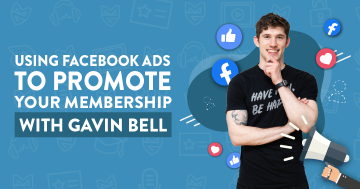As many social media channels become “noisier” by the day, and getting your message across to your audience increasingly relies upon paying for advertising; more and more people are turning towards the more traditional community-based “group” features that sites like Facebook, LinkedIn and Google+ offer.
Far from being yet another place to share a photograph of your breakfast or to spam promotional links; in most cases groups capture the essence of what social media is about – community and connection.
However that does not mean that such groups cannot be leveraged in order to help grow your membership business.
Here are 11 ways in which membership site owners can make the most of social media groups:
Find ideas for content
Social groups can be a fantastic source of ideas and inspiration.
What better place to find out about the sort of things that interest, annoy, frustrate or motivate your target audience than by mingling in alongside them?
Observe the conversations that are taking place. See what problems your market are having. Listen to the question they're asking; and then use all of that as inspiration not just for your membership content, but for blog and podcast content too.
Promote your product or content
While it's poor form to join a social media group and start shilling your membership, many groups will offer specific opportunities for promoting your product, social media links or blog content.
Pay attention to the group rules, and spend a week or so just seeing how things are done and whether the group you've joined run special promotion-friendly days or timeslots.
If in doubt, contact the group admin and ask about the protocol for promoting your stuff.
Inspiration for your website copy
Using the language of your audience is a great way of making sure that they resonate with your message.
If you can address the problems your target market are experiencing by putting them into the same wording that they themselves use, then this shows that you understand them and that you're on their level.
Observing conversations among your target audience about your chosen topic should provide plenty of pointers to use in your website content and sales message.
Validate membership idea
Taking steps to research and validate your idea is a crucial starting point for a successful membership site.
A social media group can provide a great sounding board for testing out ideas and getting feedback and input from the very people you're hoping will join your membership site.
Find collaborations
Social media groups are typically a mixed bag in terms of the knowledge level of the members as well as the reason they're in the group.
If you're in there to get ideas for your product and promote your stuff, then you can rest assured others will be too.
Rather than looking at those people as a threat, or competition, you could consider looking to collaborate with others in your field who bring something unique to the table – whether this means teaming up on a project or simply arranging a co-promotion.
Find affiliates
Speaking of co-promotions; one marketing tactic a lot of membership site owners use is to offer an affiliate program; where you offer commissions to people in exchange for them sending new members your way.
In a lot of cases you may want to be selective about the people you allow to become affiliates; in order to keep a handle on quality. Or you may simply wish to trial-run your affiliate scheme on a small basis before rolling it out publicly.
In both situations a social media group may be the best place to start when it comes to recruiting new affiliates to help promote your site.
Find guests experts and contributors
One specific way in which you could find opportunities for potential collaborations is to source guest experts and contributors from a social media group.
You may look to invite someone to present a guest training session for your paying members, where they share their expertise and experience; or you may simply invite a fellow expert to write a guest blog post or appear on your podcast.
You could even put out an “open call” for guests within groups you're a part of.
Connect with influencers
As well as potential collaborators and contributors; you'll often find that many popular social media groups also contain thought leaders and experts in a given field.
Leveraging your shared connection through a particular social media group could be a starting point for building relationships with some of the bigger names in your industry.
Build authority and credibility
With all of this talk of experts and influencers, we cannot forget a big reason why many people join a social media group – to become the expert or influencer that people flock to.
Being recognised as a credible expert or the “go-to-guy” in your field is something which is hugely beneficial to a membership site owner; and actively participating in a social group can be a great way of building a positive reputation and demonstrating your expertise on a particular subject in a very visible way.
Get Advice and Support
No man – or woman – is an island. We all need support and advice from time to time, and while social media groups are a good place for you to dispense this yourself in order to cement your status as an authority, they're also a great place to get the helping hand that you need too.
Whether that is simply getting answers to questions, soliciting feedback and suggestions, or even sourcing suppliers and contractors who can help you which specific problems or tasks in your business – remembering that social media groups are a two-way street and tapping into the support that they can provide is a great way to get a lot from them.
Run your own group
Now of course everything we've discussed so far has been in the context of participating in social groups that other people have set up and manage; however you can get even more out of groups by creating and running your own.
Not only does that enable you to do everything we've talked about so far; since you're running the show then the spotlight is on you far more than if you were just another participant in someone else's group.
You could either run a public group and aim to build it to big numbers, or maybe a private group that is only available to people who have signed up for your mailing list.
Or perhaps you want to use a Facebook group as the community element of your membership site. We have our opinions on that, but for certain markets and topics it can be a good option.
Whichever way you choose to participate in social media groups, it's clear that they're the place to be for many membership site owners, and certainly worth considering as an addition to your marketing strategy.
Do you use social media groups as a way of growing your business? Which platforms do you prefer? What groups would you recommend? Do you run a group of your own?
Let us know in the comments section below…





